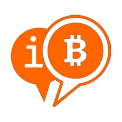Pickleball and Bitcoin both value attributes that create communities interested in learning, self-improvement and fun.
This is an opinion editorial by Hector Alvero, a Bitcoin educator who serves as co-host of the Broward County Bitcoiners meetup.

For most of us, walking the path of our individual Bitcoin journey has changed us in profound ways. We look more toward the future by improving our health, creating closer connections with those we care about (or reconnecting with them), and engaging in activities that represent our Bitcoin values. If you are looking for an activity that embodies these values in a single weird and wonderful place look no further than pickleball, the Bitcoin of sports.
If you just said, “What the heck is pickleball?” you are in the right place. Allow me to help you take your first steps down the pickleball rabbit hole and take you from no-pickler to new-pickler. If you already play, then this article might help you better understand why the sport feels like such a natural extension of who we are as Bitcoiners.
Origin Story
Like Bitcoin, pickleball combines existing equipment (technologies) from other sports and puts them together in a completely new way to create something entirely different. Pickleball was created in 1965 by Joel Pritchard, Bill Bell and Barney McCallum in Bainbridge Island, Washington. The three dads were trying to find something fun for their families to do during a summer vacation. They didn’t have a complete set of sports equipment available, so instead they took the best parts of what they had and collaborated with the kids to develop the rules for the game so that everyone would want to play (consensus mechanism).
Pickleball combines solid paddles like in paddle ball or ping pong, but in a size and shape more like racquetball racquets. It uses a net from badminton lowered to hip level like in tennis. The ball is plastic, much like the ones you might have used to play backyard baseball as a kid. The court is adapted from badminton, and the rules pull from multiple racquet sports and volleyball.
Even the name of the sport is shrouded in a bit of mystery, with Joan Pritchard saying they named it pickleball after the pickle boat in crew (the last boat to finish a race) because the oarsmen for the pickle boat are often chosen from the leftovers of other boats. Others believe the sport was named after the family dog, Pickles, who would dutifully retrieve the ball when it rolled off the court, although the Pritchards claim the dog came after and they named the dog after the sport (USA Pickleball).

Low Time Preference
One of the most valuable lessons Bitcoin teaches us is to prioritize the future over the present as we distance ourselves from the fiat world. Our time preference lowers, we stop seeking immediate gratification, and we learn the value of patience. Patience also happens to be the fundamental skill in pickleball. Success in pickleball is not about how many winners you can hit, but rather about how many points you don’t lose by making mistakes. Instead of constantly taking aggressive shots (trading), pickleball encourages patience (HODLing) and consistently executing basic shots (DCA) until the right moment arrives when the odds of winning the point are heavily in your favor. And when it does … Smash (BTFD)!
Even though the vernacular is different, you will find a lot of overlap in the languages of Bitcoin and pickleball. Below is a short sample of phrases that translate between the two. I welcome those of you who are Bitcoiners and picklers to add to the list!
Hard To Grok
Pickleball is easy to dismiss at first because, like Bitcoin, it is a little different. The rules are a little different, the equipment is a little different, and the people involved are a little different. But, like Bitcoin, once you experience the sport firsthand you realize it isn’t just different … it’s better. More importantly, it is better because it is different, and it is those differences that take new players on that familiar journey from confusion to curiosity to commitment. Players learn that playing good pickleball is counterintuitive to other sports, much like learning the fundamentals of Bitcoin is different from what we are taught about money and economics. At first, you think you should be aggressive, but then you learn to be patient. You think you should attack, but then you learn defending is more powerful. You think it will be easy, but then you learn that mastery can take a lifetime.
I was introduced to pickleball in late 2015 by Dave Leach (coincidentally, the same year I first heard about Bitcoin). Our sons were in the same Boy Scout troop and had become good friends. Dave tried explaining the game to me one night at a troop meeting. I didn’t really get it. To me, it just sounded like a weird form of mini-tennis. I listened politely and thought it was interesting, but never went out to play and forgot about it. Luckily, he kept encouraging me to give it a try and in early 2016 I went to the courts for the first time. I was instantly hooked. Like experiencing the rush of completing that first peer-to-peer transaction or holding your own keys for the first time, pickleball reels you in by perfectly balancing simplicity and challenge. This turned out to be about two months before I bought my first Bitcoin. Since then, I’ve been able to return Dave’s favor by introducing him to Bitcoin.
Accessible And Challenging
It doesn’t take much to get started in pickleball; all you need is a paddle, a ball, a court, and another player. With a couple of sessions of basic information and practice, you can go from “I’ve never played pickleball,” to enjoying fun games and holding your own on the court. However, taking the steps to learn the necessary skills to go from capable player to champion can take a lifetime. This is much like when you download a wallet and receive your first bitcoin while holding your own keys. From that moment you are a sovereign Bitcoiner, but taking the next steps to fully understand proper custody, privacy, and succession planning (not to mention economics, philosophy, etc.) can keep you engaged and intellectually challenged forever.
On your pickleball journey you will find that the biggest strides forward in your game often happen during the passive work you do off the court. After a game, you’ll have an a-ha moment like “I’m popping the ball up because I’m gripping the paddle too tightly near the net,” or, “With each step toward the kitchen, I should lessen my grip pressure by 10%.” The same thing happens to us as Bitcoiners. We make huge strides in our thinking when reading a non-Bitcoin article or having a non-Bitcoin conversation. We hear a news story about the Canadian truckers or about the failing Japanese yen and realize „This is the use case for Bitcoin.“
Proof-Of-Work
Pickleball attracts players from other sports like tennis, ping pong and racquetball. They often arrive with an „I’m new to pickleball and I’m here to fix it,“ disposition. They assume their years of experience and skill building in other sports will immediately translate into dominance in this apparently easy pickleball thing. They quickly find out, usually by repeatedly losing games to more experienced players, that they must put in the necessary time and work to develop the specific skills and strategies that translate into success in pickleball. To paraphrase Max Keiser, „You don’t change pickleball … pickleball changes you.“ Think it’s easy to be world class in pickleball? Check out this point and think again.
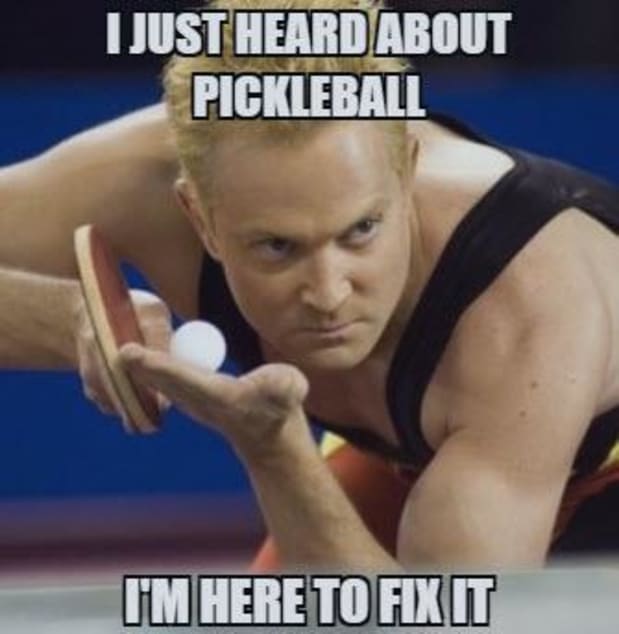
Dare To Be Different
Picklers are used to being snickered at by people that play more established racquet sports like tennis, racquetball, and squash (TradFi). They dismiss us and think “Aww, look at those pickleball players … aren’t they cute? It’s too bad they can’t play a real sport.” Then their courts get repurposed to become pickleball courts and they think “Maybe I should try it.” This is much like when normies think “Aww, look at those Bitcoiners … aren’t they cute? It’s too bad they don’t understand real money.” Then Bitcoin becomes the best performing asset in history, and they think “Maybe I should get some.”
Much like Bitcoiners proudly wear shirts that say “Rules not rulers“ and “∞/21M”, picklers proudly and unapologetically declare themselves as such by wearing merch with pickleball insider jargon like „Stay out of the kitchen!“ and „I might have a dinking problem.“
Pickleball players come from every type of political, religious, and cultural background. Like Bitcoiners, those differences sometimes come out in spirited discussions on and off the court. In the end, these differences are usually overshadowed by the common interest they share and their passion for the sport they love. What they share is more important than where they disagree, and it might even help them appreciate their differences a bit more.
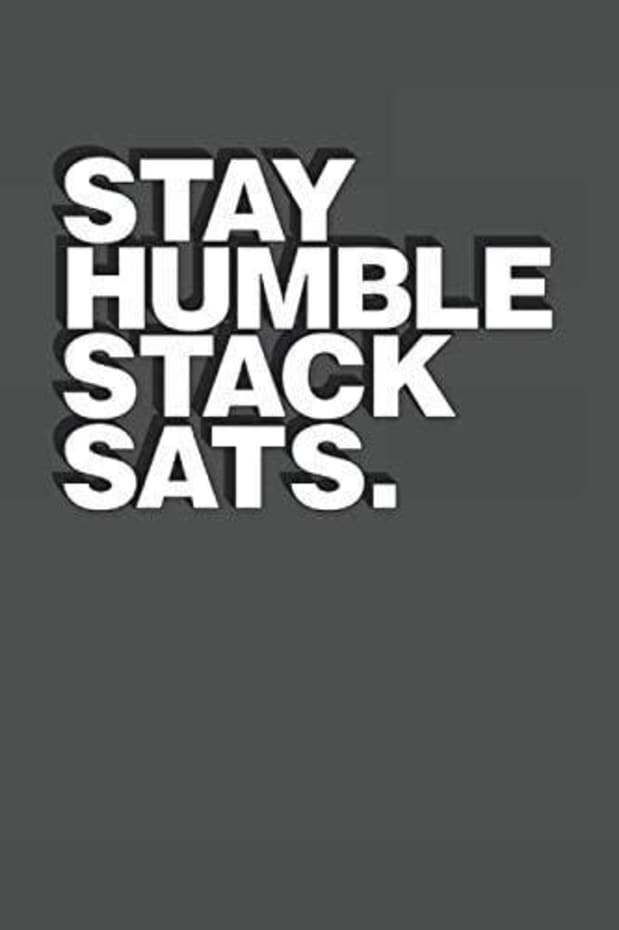
Inclusive
Pickleball welcomes anyone and everyone to learn and enjoy the sport. Whether you are young or old, tall or short, rich or poor, walking on your feet or rolling on wheels, pickleball welcomes you and says “You can join this network. You can participate, benefit from, and contribute to this community.”
Pickleball not only accepts anyone and everyone, but it also encourages players of all types to play together. It is not uncommon to see high level players helping newbies, retirees playing against teenagers (and beating them), and children beating their parents.
Pickleball is also financially inclusive; it doesn’t take a lot of money to start playing. You can buy a pair of starter paddles for $20-$30. If you can’t afford that, just show up at a local court and I guarantee someone with an extra paddle will loan it to you, teach you the rules, play with you, and invite you back.
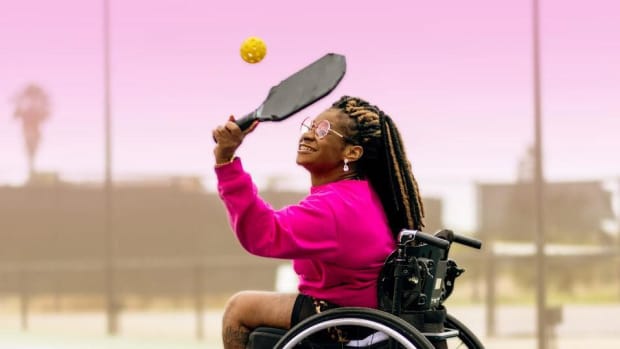
Passion
There is no passion like that of a Bitcoiner who has fully gone down the rabbit hole, except possibly for someone that has been bitten by the pickleball bug. See if any of this sounds familiar:
- They watch videos, match replays, read articles and listen to anyone that can teach them about the game.
- They constantly tell their friends how the game is fun, challenging and energizing.
- They talk about how their physical, mental and social lives have been improved by the game.
- They travel far and wide to find courts and instruction. Anything to be able to play more and improve.
- They say pickleball is life.
They play and play and they can’t get enough. You only need to hear the collective groans of 20+ people when the court lights shut off at 10 p.m. to know that pickleball is more than just another form of exercise.
Gradually, Then Suddenly
Parker Lewis’s perfectly named series has taught us that change happens gradually, then suddenly. Pickleball has grown from summer vacation family pastime to the fastest growing sport in the United States. Tennis courts, roller hockey rinks, and even basketball courts are being converted to pickleball courts everywhere, and demand is moving up and to the right. Multiple professional leagues have been started, with teams recently being formed by major celebrities like Lebron James and Tom Brady (Golden). Major networks are starting to pick up coverage of pickleball events, like the Celebrity Pickleball Challenge that recently aired on CBS (Webb). Venues for incorporating pickleball into other industries are springing up, like Chicken and Pickle and The Pickle Bar. Pickleball clubs and meetups are starting up everywhere and growing fast. Even Michael Saylor has a court at his house. The FOMO is real.
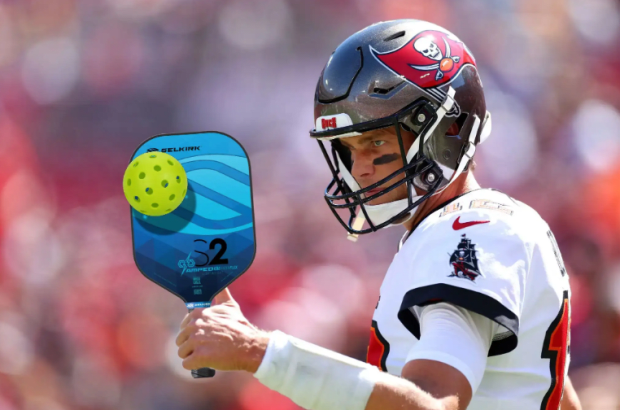
Community
No matter where you are from or where you are, if you meet a fellow pickleball player you often become fast friends. There is simply an understanding among players that if you share a love for pickleball you will likely have enough in common to get along. I have met and played with people from all over the world. Even in situations where we didn’t speak the same language, we could still communicate on the court and have a great time. Like Bitcoiners, pickleball players are givers. They freely give their time, their knowledge, and their help to anyone who wants to learn the game or improve their play.
One of the things I love most about both the Bitcoin and pickleball communities is that its stars and celebrities are approachable (rules, not rulers). Max Keiser, Cory Klippsten, and Marty Bent will gladly have real conversations with plebs like me at a conference, meetup, or event. Likewise, world class players like Steve Kennedy, Kyle Yates, and Anna Leigh Waters will play pickup games with amateurs like me and shoot the breeze about the latest happenings in the pickleball world.
Conclusion
Luckily, unlike Neo, you don’t have to choose between the orange and the yellow pill. You can take both, and by doing so discover a new world that embraces the same values that make our Bitcoin community so special. You will also find a whole new group of precoiners to potentially orange-pill. So, pick up a paddle and head to a pickleball court near you and remember … stay humble, stack sats and respect the net!
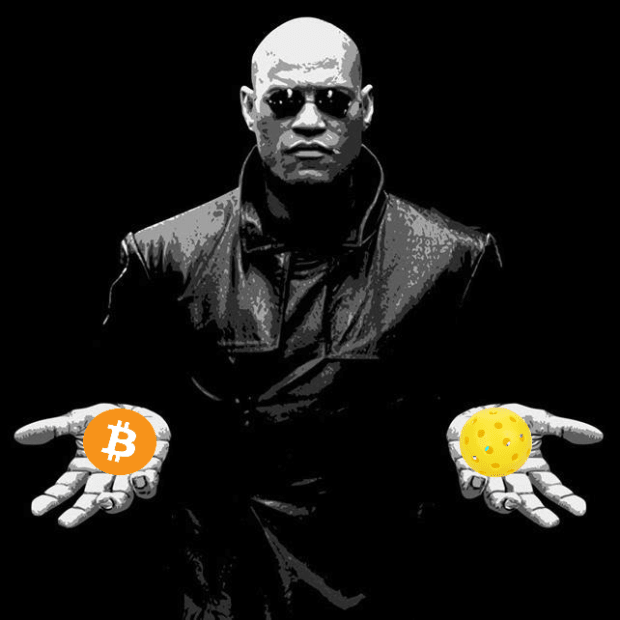
Additional Info / Resources:
- To find pickleball courts in your area, click here.
- To find Bitcoin meetups in your area, click here.
- Coming to Bitcoin 2023 in Miami? Be on the lookout for satellite pickleball event information, including a pre-conference clinic to be hosted by world class professional players and coaches. Visit the conference website for more info about pickleball and other satellite events.
- Want to see a few more great pickleball points? click here.
- To learn more about pickleball’s origin story, click here.
This is a guest post by Hector Alvero. Opinions expressed are entirely their own and do not necessarily reflect those of BTC Inc or Bitcoin Magazine
